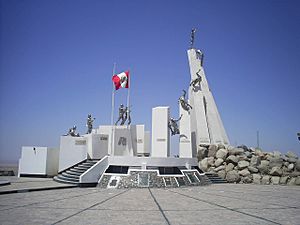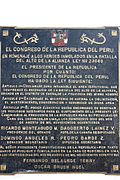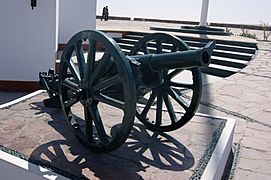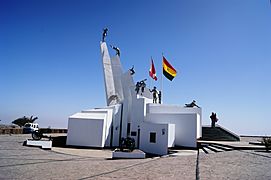Alto de la Alianza facts for kids
| Complejo Monumental Alto de la Alianza | |

The monument in 2007
|
|
| Location | Tacna, Peru |
|---|---|
| Designer | Enrique Vargas Giles, Jorge Espinoza Cáceres |
| Type | Memorial |
| Beginning date | 1979 |
| Opening date | May 26, 1983 |
| Dedicated to | Battle of Tacna |
The Alto de la Alianza Monumental Complex (which means "High Ground of the Alliance Monument") is a special historical site in southern Peru. It is located near the city of Tacna.
This monument stands where the Battle of Tacna happened on May 26, 1880. In this battle, the armies of Bolivia and Peru fought against the Chilean Army. The allied forces had to retreat, and Chile gained control of Tacna and Arica. This period was known as the "captivity of Tacna" and was part of a larger disagreement between Chile and Peru that lasted about 50 years.
Contents
What is the Alto de la Alianza Monument?
The monument is built on a flat area of Intiorko hill. It is surrounded by sand and special plants. The main part of the monument honors the soldiers who fought in the battle.
The monument has a large arch shape made of different blocks. This arch points east to west. It stands for the alliance between the armies of Peru and Bolivia. The blocks represent the different groups of soldiers from both countries.
A section of stones shows the direction of the Chilean attack. It symbolizes the strong force they used. A curved part of the monument, opposite the stones, represents the battle itself. Higher plates pointing south show how strongly the city of Tacna resisted.
Exploring the Monument Complex
In 1979, the military government of Peru decided to build this large monument. It was placed on the plain northeast of Intiorko hill. Architect Enrique Vargas Giles designed the project. Engineer Jorge Espinoza Cáceres managed the building. Holger Carpio Deztre created the sculptures.
The Alto de la Alianza Museum
The Campo de la Alianza Site Museum is a war museum. It is located right under the Alto de la Alianza monument. The museum first opened on May 26, 1982. It helps visitors learn more about the battle and the history of the area.
Main Monument Features
The monument has the arch shape and beautiful surroundings we talked about earlier. There is also a cemetery nearby. It has over 700 crosses. Each cross represents a group of soldiers or individuals who died in the battle.
In the cemetery, there is a large marble cross. It has a special message from historians Jorge Basadre Grohmann and José Jiménez Borja. This message honors the soldiers who fought in the Battles of Tacna (May 26, 1880) and Arica (June 7, 1880).
The message explains that these soldiers were strong. They believed freedom was more important than anything. They loved their homes and did not want what belonged to others. But when their land was unfairly attacked, they stood together to protect their cities. They fought until they could fight no more. The message ends by saying that their memory shines brightly as justice for their cause approaches.
The monument also has eight sculptures made of stainless steel. Artist Holguer Caprio Dextre created them. Stainless steel was used so the sculptures could last a long time in the outdoor environment. These sculptures show important moments and feelings from Tacna's history. They represent heroism, rising again after difficulties, and looking to the future.
| Name | What it Represents |
|---|---|
| The Awakening of the Homeland (Spanish: El despertar de la Patria) |
This sculpture shows a figure sitting up. It reminds us of the 1811 Tacna rebellion led by Francisco Antonio de Zela. It shows how people reacted to defend their land when it was threatened. |
| The Heritage of Heroism (Spanish: La herencia del heroísmo) |
This sculpture shows a mother teaching her child about brave traditions. It also represents how people gave their few resources and even their lives to protect their country. |
| The Decision of Honour (Spanish: La decisión del Honor) |
This sculpture shows two soldiers holding a weapon. It represents the alliance between Peru and Bolivia. They stood together to defend their freedom against the enemy army. |
| Martyrdom (Spanish: La Inmolación) |
This sculpture symbolizes the sad events of the battle. It shows the great sacrifice made by the defenders against a powerful enemy. |
| Indomitable People of Arica (Spanish: Indómito pueblo de Arica) |
This sculpture shows the suffering of the people of Arica during the time it was under foreign control. |
| Indomitable People of Tacna (Spanish: Indómito pueblo de Tacna) |
This sculpture shows the suffering of the people of Tacna during the time it was under foreign control. |
| The Return to the Homeland (Spanish: El retorno a la Patria) |
This sculpture shows a strong figure standing tall. It represents the moment when Tacna became part of Peru again. |
| The Homeland (Spanish: La Patria) |
This final sculpture is at the very top of the Monumental Complex. It symbolizes Tacna being welcomed back into its home country. |
Gallery
See also
 In Spanish: Complejo Monumental Alto de la Alianza para niños
In Spanish: Complejo Monumental Alto de la Alianza para niños
 | Roy Wilkins |
 | John Lewis |
 | Linda Carol Brown |




